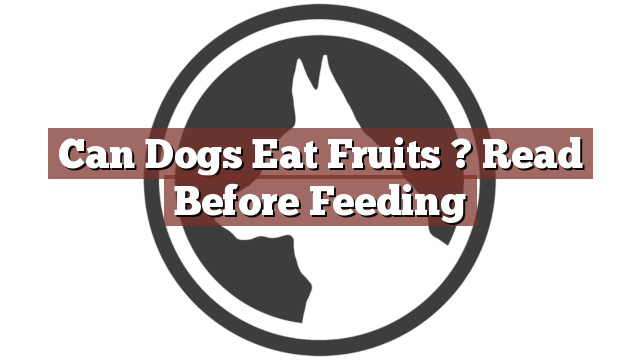Understanding Your Dog’s Dietary Needs
As a dog owner, it is important to understand your furry friend’s dietary needs to ensure their overall health and well-being. While dogs are primarily carnivores, their digestive system is capable of processing certain fruits and vegetables. However, it is crucial to be aware of which fruits are safe for dogs to consume and which ones can be harmful.
Can Dogs Eat Fruits? Read Before Feeding
Can dogs eat fruits? The answer is yes, but with some important considerations. While fruits can be a healthy addition to your dog’s diet, not all fruits are safe for them to consume. It is essential to know which fruits are safe and which ones can be toxic to your canine companion.
Some dog-friendly fruits include apples, bananas, blueberries, strawberries, and watermelon. These fruits are low in calories, high in fiber, and packed with essential vitamins and minerals that can benefit your dog’s health. However, it is important to remove any seeds, pits, or rinds before feeding fruits to your dog, as they can pose a choking hazard or contain toxins.
Pros and Cons of Feeding Fruits to Your Dog
Feeding fruits to your dog can have several benefits. Fruits provide a natural source of vitamins and antioxidants, which can boost your dog’s immune system and promote optimal health. Additionally, the high fiber content in fruits can aid in digestion and maintain a healthy weight for your furry companion.
However, it is crucial to be aware of the potential downsides of feeding fruits to your dog. Some fruits, such as grapes, raisins, and cherries, can be toxic to dogs and should never be fed to them. These fruits can cause severe health issues, including kidney failure. Furthermore, feeding too much fruit to your dog can lead to gastrointestinal upset, such as diarrhea or an upset stomach.
Conclusion: Making Informed Choices for Your Dog’s Health
In conclusion, fruits can be a healthy and nutritious addition to your dog’s diet. However, it is crucial to choose the right fruits and feed them in moderation. Always consult with your veterinarian before introducing any new foods to your dog’s diet, especially if they have any pre-existing health conditions or dietary restrictions.
Remember to remove any seeds, pits, or rinds from fruits before feeding them to your dog, and avoid feeding them toxic fruits such as grapes, raisins, and cherries. By making informed choices and understanding your dog’s specific dietary needs, you can provide them with a balanced and nutritious diet that supports their overall health and well-being.
Thank you for taking the time to read through our exploration of [page_title]. As every dog lover knows, our furry friends have unique dietary needs and responses, often varying from one canine to another. This is why it's paramount to approach any changes in their diet with caution and knowledge.
Before introducing any new treats or making alterations to your dog's diet based on our insights, it's crucial to consult with a veterinarian about [page_title]. Their expertise ensures that the choices you make are well-suited to your particular pet's health and well-being.
Even seemingly harmless foods can sometimes lead to allergic reactions or digestive issues, which is why monitoring your dog after introducing any new food item is essential.
The content provided here on [page_title] is crafted with care, thorough research, and a genuine love for dogs. Nevertheless, it serves as a general guideline and should not be considered a substitute for professional veterinary advice.
Always prioritize the expert insights of your veterinarian, and remember that the health and happiness of your furry companion come first.
May your journey with your pet continue to be filled with joy, love, and safe culinary adventures. Happy reading, and even happier snacking for your canine friend!

